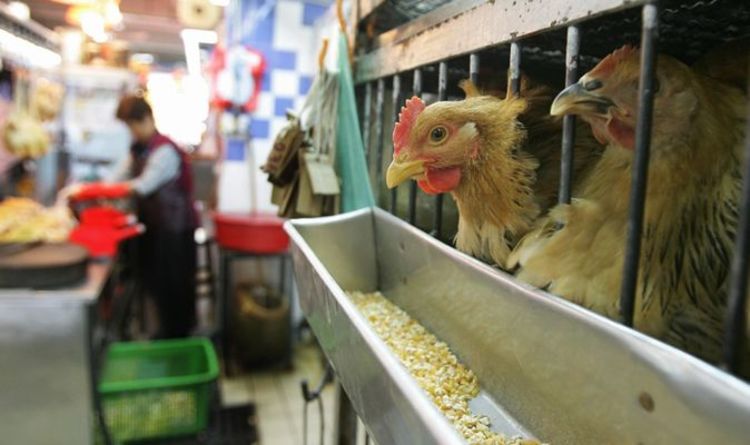China: Wet markets captured selling dog meat to humans
We use your sign-up to provide content in ways you’ve consented to and to improve our understanding of you. This may include adverts from us and 3rd parties based on our understanding. You can unsubscribe at any time. More info
Shocking footage has emerged of live animals being kept in cages and sold on the streets China, Indonesia, Vietnam, Thailand, Laos and Sri Lanka. An investigation by People for the Ethical Treatment of Animals (PETA) has uncovered cats, rabbits, monkeys and even bats trapped in inhuman conditions.
In Thailand, cats are confined to a tiny square cage with little room to stand on all fours.
Monkeys are also restricted to a strong metal structure with hardly any space to fits its hand through the bars.
In Indonesia, bats are also hung upside down without any room to spread its wings.


Meanwhile in Laos, workers are seen handling raw meat just yards away from the infested and dead live stock.
The coronavirus pandemic is believed by some to have originated from a wet market in Wuhan.
Traces of COVID-19 was first discovered in the Chinese city in December 2019 – but the origin of the disease is yet to be fully understood.
Animals sold at the notorious food market, include bats and pangolins, which are subject to some theories that the virus may have been ingested by a human and passed on.

Several Asian countries, including China, have passed new laws to curb the sale of wild animals and limit wet markets.
However, attempts to stamp out the bizarre culture remain hamstrung in many regions due to the popularity and economic value of bush meat.
In April, the WHO along with the World Organisation for Animal Health (OIE) and United Nation Environment Programme (UNEP) made a move to outlaw the trade of live animals for consumption and breading.
Officials outlined a six-page document to highlight the health dangers.

It said: “WHO, OIE and UNEP call on national competent authorities to suspend the trade in live caught wild animals of mammalian species for food or breeding purposes and close sections of food markets selling live caught wild animals of mammalian species as an emergency measure.”
The guidance warned keeping and killing animals in cages, especially in open spaces, is “increasing the risk of transmission of pathogens”.
It added: “Significant problems can arise when these markets allow the sale and slaughter of live animals, especially wild animals, which cannot be properly assessed for potential risks – in areas open to the public.
“When wild animals are kept in cages or pens, slaughtered and dressed in open market areas, these areas become contaminated with body fluids, faeces and other waste.
DON’T MISS
‘Stop all EU goods coming to UK!’ Furious Britons vow boycott [INSIGHT]
Royal Family LIVE: Duchess’s ex-pal hits out over snub [LIVE]
UK weather forecast: Sweltering heatwave temperatures to soar to 90F [FORECAST]

“Increasing the risk of transmission of pathogens to workers and customers and potentially resulting in spillover of pathogens to other animals in the market.
“Such environments provide the opportunity for animal viruses, including coronaviruses, to amplify themselves and transmit to new hosts, including humans.”
A spokesperson for PETA said wet markets create a “breeding ground” for new deadly viruses.
They said: “These markets are breeding grounds for new zoonotic diseases including a deadly Covid-21, and given Covid-19 rates are sky-rocketing in the UK at the moment perhaps it could be a timely reminder as to how we got into this mess in the first place.”
Source: Read Full Article





